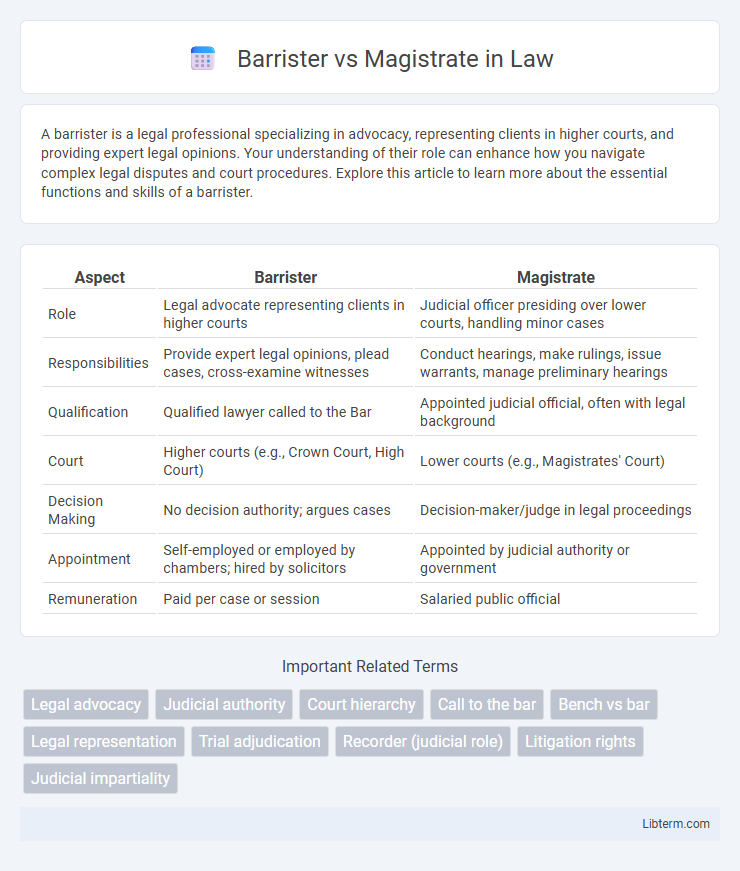A barrister is a legal professional specializing in advocacy, representing clients in higher courts, and providing expert legal opinions. Your understanding of their role can enhance how you navigate complex legal disputes and court procedures. Explore this article to learn more about the essential functions and skills of a barrister.
Table of Comparison
| Aspect | Barrister | Magistrate |
|---|---|---|
| Role | Legal advocate representing clients in higher courts | Judicial officer presiding over lower courts, handling minor cases |
| Responsibilities | Provide expert legal opinions, plead cases, cross-examine witnesses | Conduct hearings, make rulings, issue warrants, manage preliminary hearings |
| Qualification | Qualified lawyer called to the Bar | Appointed judicial official, often with legal background |
| Court | Higher courts (e.g., Crown Court, High Court) | Lower courts (e.g., Magistrates' Court) |
| Decision Making | No decision authority; argues cases | Decision-maker/judge in legal proceedings |
| Appointment | Self-employed or employed by chambers; hired by solicitors | Appointed by judicial authority or government |
| Remuneration | Paid per case or session | Salaried public official |
Overview: Barrister vs Magistrate
Barristers are legal professionals specializing in courtroom advocacy and litigation, primarily representing clients in higher courts. Magistrates are judicial officers who preside over lower courts, handling minor criminal cases, preliminary hearings, and civil disputes with limited jurisdiction. The key distinction lies in barristers acting as advocates for parties, while magistrates serve as impartial decision-makers in the judicial process.
Key Roles and Responsibilities
Barristers specialize in representing clients in higher courts, providing expert legal advice, drafting pleadings, and advocating during trials. Magistrates preside over lower courts, making decisions on criminal cases, family disputes, and minor civil matters while ensuring legal procedures are followed. The key difference lies in barristers' advocacy and legal expertise versus magistrates' judicial decision-making and case management roles.
Educational and Professional Requirements
Barristers must complete a law degree followed by the Bar Professional Training Course (BPTC) and secure pupillage to gain rights of audience in higher courts. Magistrates typically do not require formal legal qualifications but undergo specialized training and assessment before appointment, focusing on practical judicial skills and community representation. The barrister's path emphasizes academic excellence and advocacy expertise, whereas magistrates rely on judicial training and experience to preside over lower court matters.
Courtroom Presence and Functions
Barristers specialize in courtroom advocacy, presenting evidence and legal arguments before judges and juries with persuasive oratory skills. Magistrates primarily oversee preliminary hearings and minor cases, ensuring legal procedures are followed and delivering judgments in less complex matters. The barrister's role centers on argumentation and representation, while magistrates focus on adjudication and maintaining courtroom order.
Training and Appointment Processes
Barristers undergo rigorous legal education followed by specialized vocational training such as the Bar Professional Training Course and a period of pupillage before being called to the Bar. Magistrates, often laypersons without formal legal qualifications, receive comprehensive training through magistrate induction courses and continuous professional development provided by the Magistrates' Association or similar bodies. Appointment of barristers is typically based on academic merit and legal aptitude assessments, whereas magistrates are appointed through a community-based selection process involving interviews and references to ensure suitability for judicial responsibilities.
Decision-Making Authority
Barristers primarily serve as legal advocates in court, presenting cases and providing expert legal opinions but do not hold decision-making authority in judicial proceedings. Magistrates, on the other hand, are judicial officers vested with the power to make legally binding decisions, including rulings on cases, sentencing, and other judicial determinations within their jurisdiction. The decision-making authority of magistrates directly influences the administration of justice, distinguishing their role from that of barristers who support the process through legal representation.
Interaction with Clients and the Public
Barristers primarily interact with clients through formal consultations, providing specialized legal advice and representing them in higher courts, focusing on case strategy and courtroom advocacy. Magistrates engage directly with the public in a judicial capacity, presiding over minor criminal cases and preliminary hearings, ensuring fair conduct and legal compliance in magistrates' courts. The client interaction for barristers is confidential and case-specific, while magistrates maintain a neutral, authoritative presence during public court proceedings.
Areas of Legal Expertise
Barristers specialize in courtroom advocacy, legal drafting, and advisory roles primarily in complex civil and criminal cases, often representing clients in higher courts. Magistrates handle lower court matters, including preliminary hearings, minor criminal offenses, family disputes, and administrative cases, focusing on swift resolution and legal procedure enforcement. The expertise of barristers centers on advocacy and in-depth legal argumentation while magistrates concentrate on judicial decision-making and case management within summary justice jurisdictions.
Career Pathways and Progression
Barristers typically follow a career pathway involving specialized legal training, pupillage, and gaining courtroom experience before advancing to become senior counsel or judges. Magistrates, often appointed from experienced legal professionals or respected community members, progress through judicial training and tenure, with opportunities to rise to higher magistrate roles or administrative positions. Career progression for barristers emphasizes advocacy and specialization, whereas magistrates focus on judicial decision-making and case management within lower courts.
Comparative Salary and Job Outlook
Barristers often earn higher salaries than magistrates due to their specialized legal expertise and the potential for private practice income, with barristers in top-tier markets earning an average annual salary ranging from $70,000 to over $200,000. Magistrates typically receive a stable, government-funded salary averaging between $50,000 and $120,000 annually, reflecting their role in handling lower-level judicial matters. Job outlook for barristers remains competitive but growth is steady in high-demand sectors like corporate law, while magistrate positions are expected to maintain consistent demand driven by judicial system needs and government appointments.
Barrister Infographic

 libterm.com
libterm.com